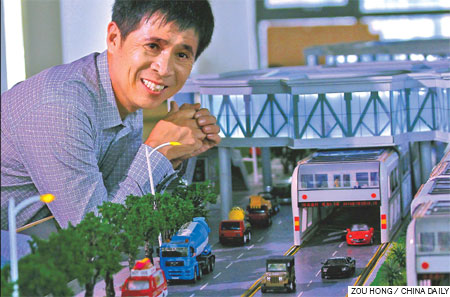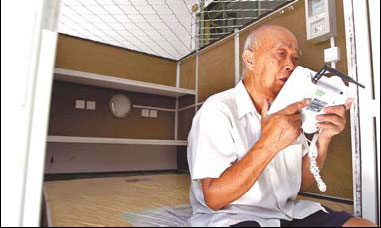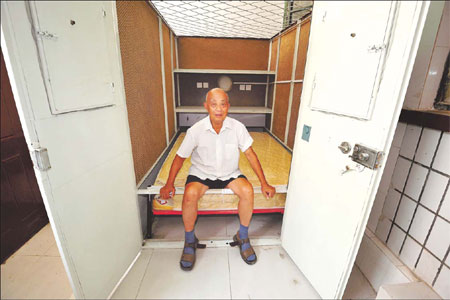Life and Leisure
Urban Ingenuity
By Liu Yujie and Wang Wei (China Daily)
Updated: 2010-10-17 09:52
 |
Large Medium Small |

|
Huang Rixin designed the capsule apartment because he empathized with the young but penniless new graduates flocking to Beijing to look for their dream jobs. Fu Tian / China News Service |
|
Huang Rixin's capsule apartments are designed for newly graduated job-seekers who he says, remind him of his own grand-child. Cao Haipeng / China foto Press |
China's fathers of invention are inspired by mundane things such as rush hour grid-locked traffic and cramped living conditions for student job-seekers. The China Daily Sunday team of Liu Yujie and Wang Wei comes face to face with genius.
Song Youzhou (above) is a man with no more than six years of formal schooling. Yet this unassuming son of a tractor technician is hogging the headlines with his latest invention, a futuristic vehicle that can straddle car lanes and may finally ease Beijing's chronic traffic gridlock. The Elevated High-speed Express Bus pilot project is to start by the end of the year and see completion by 2012. The concept is brilliant, with the straddle-bus making use of space above the cars. It will run on electricity and solar panels mounted on the roof of the buses, providing a clean, green answer to Beijing's road woes. That is only one of Song's many inventions. "I was not a good student at school. I was busy thinking of things no one had ever heard of," Song, 52, says with a naughty smile.
His first invention was made when he was only 17 years old. While waiting for a train at a railway station, he watched as a woman cleaner struggled with an antiquated mop as she wiped the floor.
Returning home, Song pondered how to create a machine that could mop the floor as well as filter off litter at the same time.
Months of thinking, designing and experimenting later, he finally came up with a little wooden contraption that could do the job. But it was not an instant hit, although it did prove to Song that he had the makings of an inventor.
Since there were no patent laws back then, Song did not get any money from his first invention, but it did spur him to further inventions.
For Song, it is the things around him that keep him questioning, thinking and inventing. He looks at everything with a fresh eye, refusing to accept the inconveniences in daily life that most people take for granted. To him, there is always room for improvement.
Among his more than 120 patented and unpatented inventions, Song's favorites are his roadside stacked parking system and his confetti fireworks.
He says the stacked parking system, which makes use of the space above pavements and green lung areas using individual hoists, solves a crucial roadside problem.
The confetti fireworks, he believes, revived a failing industry once in trouble.
"In the past, firework manufactures complained about bad sales, as more and more cities imposed restrictions on fireworks due to environmental and safety reasons.
"My invention of confetti avoided all the negative effects of fireworks. It can be used in the day as well."
Song says his secret is to go right back to the essence of the problem and think out of the box. For example, while everyone regard fireworks as for the night, Song tries to create fireworks that spew confetti and adds color during the day.
Likewise, when others rack their brains on building large parking lots, Song focused on utilizing the available space, a concept he again applied to the Elevated High Speed Bus.
For Song, genius is fuelled by passion, perseverance and diligence.
He says inspiration is just the starting point of a long journey toward invention.
The most difficult and time-consuming part is the designing process, which involves countless trials and corrections.
"When an invention is complete, people say 'it looks so simple'. They don't see how it became that simple. The simplest things invariably take the most complicated thinking to create," Song says.
To add to it, the inventor does not believe in just one solution, but in creating back-up solutions just in case the one he favors fails.
The inventing is a full-time process that excludes all else, but Song enjoys every minute.
"I am so obsessed with inventing things that I cannot remember a weekend off or a carefree Spring Festival ever since I became a professional inventor. For me, work and play has become one."
Song says it is diligence and enthusiasm that makes a good inventor, not qualifications. But there is an enormous amount of homework and research to do.
"I'm only someone who comes up with new ideas, not an expert in certain fields. When I encounter technical problems, I read reference books and consult experts in the field," he says.
Invention does not mean indulgence. After all the hard work, the invention has to be verified, examined, corrected and finally certified by technical expertise in the specific fields.
"A good invention should not be alienated from reality. All my inventions are done after in-depth research into the market. I don't indulge in fantasies. Rather, I keep close watch on the inconveniences that plague our daily lives and capture the business opportunities therein."
For Huang Rixin, it was more social conscience which spurred his need to invent. Although he has been officially retired for more than 10 years, the former designer of hydro-electric dams has never been busier.
All day, every day, he labors on searching for ways to improve and upgrade his plans for capsule apartments - an invention that puts him squarely in the limelight lately.
He had read about the plight of Beijing's "ant tribe" - young job-seekers fresh from college that had flocked to the capital in search of fame, fortune or merely a steady job in the land of opportunity.
More often than not, they find themselves at the bottom rung of the job market, making less than 2,000 yuan ($301) a month and living 8 to 10 in a room in cramped conditions.
Reports said there were at least 100,000 of these young people in Beijing and Huang felt for them.
He had also read about capsule hotels in Japan where tiny rooms for one provided basic amenities and privacy. That was when he started thinking how he could design a little apartment for the "ants" along the same lines.
"These young people are the same age as my own grandchild and I felt sad to see them live this way. I wanted to help them," he says.
"Capsule apartments work where land resources are limited. I believe it will work in big cities such as Beijing and Shanghai."
Huang launched his first experiment on the third floor of a three-story building in Beijing's Haidian district, where he rented three rooms and renovated them into eight units.
Each unit was only big enough to accommodate a single bed, but at 250 yuan per month, they were snapped up immediately.
But things did not go as planned. Two months later, the units were removed after new rental regulations stipulated that per capita living space in a single-story property must be no less than 4 square meters.
Currently Huang is working on bigger and better-equipped third generation capsule units. These are in Mentougou outside the West Fifth Ring Road, just 20 km from his original project.
Here, Huang has divided a 53-square-meter space into eight "capsules" - seven are single-bed rooms and one has a double-bed.
The capsule apartments share kitchen, shower and living room facilities.
In addition, the new apartments use fireproofing and soundproofing foam bricks to replace reinforced concrete, reducing the cost per unit from 2,500 yuan by more than half to just 1,000 yuan.
"It took two or three days to finish one steel structured apartment," Huang says. "By using foam bricks we can build dozens in one month."
He hopes to lease out the double-bed unit for around 450 yuan and single-bed units for 350 yuan.
On the pension they have, Huang and his wife could have lived comfortably after retirement. Instead, his capsule apartment project has cost him more than 50,000 yuan in savings.
But the inventor is stoic.
"I won't leave a penny to my children like most Chinese parents do. I want to use my money to do something really meaningful."
Right now, he is more worried about sustaining his invention, and he hopes real estate developers will become interested and purchase the plans from him, making such homes available to the masses in future.
Perhaps Huang has a good chance of marketing his invention, for as Song Youzhou observes, many inventions fail because there is no market demand.
But China's fathers of invention seem equally motivated by higher ideals, and their genius seem to be inspired by social responsibility and a legacy for posterity, more than any commercial success.

